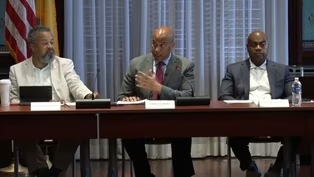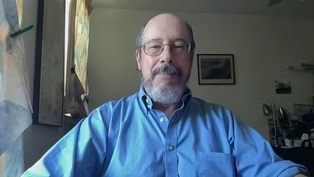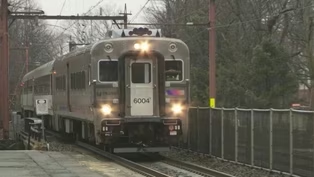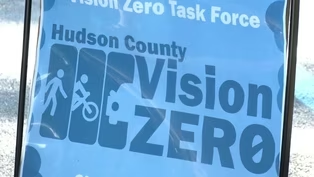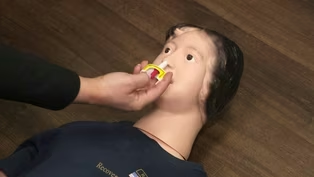NJ Spotlight News
Federal health officials recommend reclassifying marijuana
Clip: 8/31/2023 | 4m 26sVideo has Closed Captions
Interview: Rob Mejia, Stockton University
U.S. health officials have recommended marijuana be moved from a Schedule 1 to Schedule 111 drug under federal law.
Problems playing video? | Closed Captioning Feedback
Problems playing video? | Closed Captioning Feedback
NJ Spotlight News is a local public television program presented by THIRTEEN PBS
NJ Spotlight News
Federal health officials recommend reclassifying marijuana
Clip: 8/31/2023 | 4m 26sVideo has Closed Captions
U.S. health officials have recommended marijuana be moved from a Schedule 1 to Schedule 111 drug under federal law.
Problems playing video? | Closed Captioning Feedback
How to Watch NJ Spotlight News
NJ Spotlight News is available to stream on pbs.org and the free PBS App, available on iPhone, Apple TV, Android TV, Android smartphones, Amazon Fire TV, Amazon Fire Tablet, Roku, Samsung Smart TV, and Vizio.
Providing Support for PBS.org
Learn Moreabout PBS online sponsorshipmeanwhile U.S health officials this week recommended easing restrictions on marijuana the drug is still illegal at the federal level even as adult use recreational markets expand here in New Jersey and across the country according to reports from Bloomberg News a top leader at the Department of Health and Human Services sent a letter on Tuesday to the DEA requesting marijuana to be reclassified from a schedule 1 to a schedule 3 drug which would be one of the most significant reforms to cannabis in modern history here to talk about what this shift would mean is Rob Mejia an adjunct professor at Stockton University's cannabis studies Department Robert I mean you're obviously very tuned in to what's happening within the Cannabis industry how big a deal would this be if in fact marijuana does get rescheduled well it would definitely be historical so to give some very quick context Back in 1970 when Richard Nixon was President he put in the controlled substance act and that created five different categories of drugs and at that point cannabis was put as a level one drug level one substance which means it was highly addictive no medical applicability and subject to a lot of abuse it was put there on the same in the same section with Heroin LSD peyote so it's pretty remarkable that Daddy had happened so we've been living with that system since 1970 so essentially this this would be the first time that it had moved from a schedule one to potentially a schedule three and then schedule three to give you some context that's where ketamine and anabolic steroids which is manufactured lab testosterone those are two substances that are scheduled three so yeah it's a great example I mean these are drugs that can legally be obtained with a prescription yet we have all of these cannabis markets New Jersey included where folks can buy this legally if you're of age how has that affected the industry from expanding when at the federal level this is still illegal yeah the biggest winners if this really does go through and let me say first of all that this is not a done deal so what happens is that the FDA Health and Human Services in consultation with Nita the National Institute of drug abuse they all have been conducting a medical and scientific review of cannabis they have come up with a recommendation that it be placed on schedule three now it's up to the DEA to also do their own determination to decide whether it in fact should go to schedule three so it's not a done deal now but if it does go through the very biggest winners are those who are current cannabis operators because when it goes from schedule one to schedule three that means that part of the tax code that cannabis has been laboring under and has really been pummeled under is called 280e well 280e did not allow for normal deductions and you are not allowed to run cannabis as a normal business you have to pay exorbitant taxes and so getting rid of 280e that means that that is going to open up profitability for the Cannabis operators and it will also open up investment because now it'll be much more attractive to invest in a business that can have regular cash flow so the fact that 280e would go away that is the one biggest thing that current cannabis operators are dancing around about okay so since you touched on it let me just ask you quickly in the time we have left this classification has really hindered folks yes with getting lines of credit doing regular banking folks who are looking to break into the Cannabis industry will it make it easier for them it should because it's a signal that it looks like we're going to be loosening up some regulations going forward so that when Congress is back in section in session they can take up the safe Banking Act again and it will be hopefully a little more palatable for them to do that so it does indicate that banking may open up Robert Mejia is an Adjunct professor at Stockton University's cannabis studies Department Robert thanks so much now you're very welcome
Booker, mayors call for more violence-intervention efforts
Video has Closed Captions
Clip: 8/31/2023 | 4m 16s | The community-based programs are aimed at interrupting cycles of chronic violence (4m 16s)
Federal agency impedes Hudson-Bergen Light Rail expansion
Video has Closed Captions
Clip: 8/31/2023 | 3m 55s | Interview: Larry Higgs, transit reporter for NJ.com (3m 55s)
NJ Transit engineers authorize strike, no immediate action
Video has Closed Captions
Clip: 8/31/2023 | 1m 20s | A court injunction prohibits union members from engaging in a strike for now (1m 20s)
No more deaths on Hudson County roads is task force mission
Video has Closed Captions
Clip: 8/31/2023 | 3m 42s | Vision Zero initiative is being expanding to every road in the county (3m 42s)
Teaching people how to reverse opioid overdoses
Video has Closed Captions
Clip: 8/31/2023 | 4m 28s | On International Overdose Awareness Day, classes in the use of Narcan are held (4m 28s)
Providing Support for PBS.org
Learn Moreabout PBS online sponsorship
- News and Public Affairs

Top journalists deliver compelling original analysis of the hour's headlines.

- News and Public Affairs

FRONTLINE is investigative journalism that questions, explains and changes our world.












Support for PBS provided by:
NJ Spotlight News is a local public television program presented by THIRTEEN PBS
